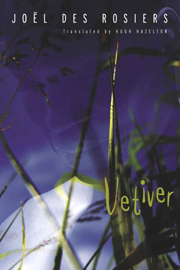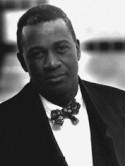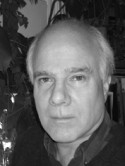
About the book
- Winner of the Governor General's Award for Translation
- Winner of the Grand Prix du Livre de Montréal
- Winner of the Grand Prix du Festival International de La Poesie de Trois Rivieres
About the author

Joël Des Rosiers, a direct descendant of Nicolas Malet, the revolutionary colonist and signatory of the Act of Independance, was born in Cayes, Haiti in 1951. He moved to Canada during his adolescence when his family was granted exile. Des Rosiers later moved to Strasburg for his studies and joined the situationist movement in the early 1970s. Throughout these years, he provided clandestine accommodation for dozens of refugees and sans-papiers in Alsace.
A psychiatrist who has travelled widely, Des Rosiers has also published four collections of poetry and a collection of essays, including Métropolis Opéra, Tribu, finalist for the Governor General's Award, Savanes, winner of the Prix d'excellence de Laval, and Théories caraïbes, winner of the Prix de la Société des écrivains canadiens.
About the translator

Hugh Hazelton is a poet and translator who teaches Spanish translation at Concordia University in Montreal. He has published three books of poetry, the most recent of which was Antimatter, and translated eight books, as well as a number of video and filmscripts, from Spanish and French into English. His critical work specializes in the interface between Québec, Canadian, and Latin American literatures.
Excerpt
"Cayenne"
she spoke with a certain absence in her gestures
saying she wanted a dedication
and that she’d been spying on me long before I arrived in Cayenne
because she’d found out the names of the writers who’d been invited
and had copied my photograph
as well as the uselessly flattering biographical note
that she got off an Internet site
and that photograph she said the one in which
I wore a bow tie that looked like it had been tied by hand
had inspired her to write letters that she addressed to me
but could never bring herself to send
because her thoughts had gotten away from her and in her opinion
it was horrible
to write only for oneself and not send off the letters
to their recipient and so risk leaving them without even an echo
ƒ
she said she’d gone
to the first book fair ever held in Cayenne
to meet me in person
unlike all those people who press forward
without looking or linger
around the books
alone or with their families
enthusiastic or indifferent silent or garrulous
at times without any other reason than simply to be seen there
she came
herself
for a specific reason
to ask me to dedicate a book
to her
ƒ
because I was she said according to the biographical notes
she’d attentively read both a doctor and a writer
and my double profession
conferred on me in her eyes an exquisite understanding of people
in other words a knowledge of pain
because I looked at them with one eye on their life
and the other on their death
and adding literature to medicine forced me
to give people back the insidious gift
I had received of their suffering
she said that by delving into that space beyond their bodies and
their souls I revealed to others and especially to her
my immense desire to heal and that this understanding of others
presupposed a fascination with misfortune
that she had no trouble understanding and
that was enough for her to trust me
ƒ
she said that was the main reason she’d spoken to me
and for the sake of which she asked me to be truthful
that is to write just for her
on a card with a reproduction of a painting by Matisse
which she’d specifically brought with her and now placed upon the table
next to the pile of books a sort of portrait
a dedication that would show her truth light and shadow
she said which I was most certainly capable of drawing out from her
from the first time I set eyes on her
from our very first encounter an immemorial
nameless thing that would set her apart from the people around her
and that I shouldn’t avoid her request
and that although she was for me a kind of stranger
this shouldn’t provide me with any excuses because
when you really thought about it
what she was asking me for didn’t have to be that personal
ƒ
even though she hadn’t yet read a single one of my books
she said that my voice which she’d heard on Radio France International
during the program on visiting writers
had crept into her mind strangely enough not so much
for what it actually contained as for the language that carried it along
and more important than the features of my face
which she had already perfectly memorized
in order to recognize me
she had observed the liberated way I moved on television
my origins gave me away she said as I strolled through
Place des Palmistes but what she’d appreciated most of all was
the mixture of intelligence and humour in the comments I made
on the architecture of creole houses adorned with wrought-iron balconies
when the afternoon light made them seem unreal
she said she’d told herself now here’s a writer who finally
doesn’t take himself too seriously
ƒ
she said she had only been in Cayenne for a short time
that she had lived before in the 16th arrondissement in Paris
and that she’d come to French Guiana just for a change
perhaps out of nonconformity or because she was bored
and most probably for some reason still unknown to her
she said that even supposing I had wanted to
I couldn’t have avoided her request
I was neither a real writer nor a true doctor
or else if I’d risked embarking on both professions
which seemed so opposed to one another it was because she said
I felt free enough of any double association
sufficiently carried along by my double vocation
to answer this kind of question and because she calculated
on observing my photo that behind a sad smile
I was trying to hide a kind of melancholy
that was concealed in my eyes
ƒ
she said that on account of my destiny
I led a double life
the risks of which I should accept
including that of granting her wish
and that a true writer (which wasn’t necessarily what I was)
had the capacity to sound out souls
to be able to feel like others the excessive love that threatens
the devastation of feelings that don’t by rights belong to it
and that it’s from this ability
that the writer draws the sense of his existence
and what’s more she said if I were a true physician
I wouldn’t have the slightest chance of escaping her wish
because she could be ill she could be in pain
she could be in distress even without knowing it
and her desire despite the unusualness of the situation
could correspond perfectly to a symptom
a sign even if she wouldn’t dream of expressing it that way
of the upheaval of time
and of her way of living triggered by my presence
she said she’d never felt such desire for a dedication








 Back to top
Back to top